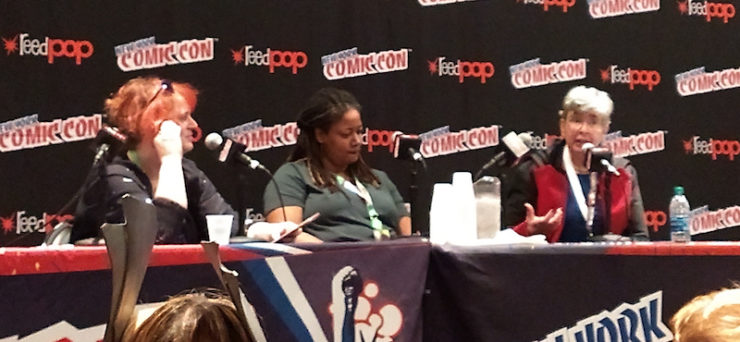“One of the markers of [the] current age is that we’re starting to talk about who sets the classics,” The Stone Sky author N.K. Jemisin said at NYCC’s recent panel The New Classics of SFF. In response to moderator Petra Mayer’s (from NPR Books) opening question—what makes a classic work of SFF?—Jemisin explained that having conversations about whose stories are central helps to expand what constitutes the canon of science fiction and fantasy works. The notion of a canon was Provenance author Ann Leckie’s contribution, likening it to her study of the classical canon of music in college. But where she received her training from one or two handpicked textbooks, today’s readers have the internet, which allows for so many conversations to be seen simultaneously. Leckie made the argument that there is no longer “a single list of canonical classics, but a bunch of intersecting and interpenetrating lists.”
Here Jemisin respectfully disagreed, pointing out that the “literary commons are not open to everybody just yet” and that there are still divides to be breached in terms of internet access. In fact, she said, “I don’t know how I feel about a canon anymore. … The sheer volume of books that exist out there means that a canon is no longer possible.” Instead, she focused on the notion of classics themselves, defining them as “the books that change your thinking, that blow your mind, that reorder your world.”
That could easily describe both writers’ series: Leckie’s Imperial Radch trilogy, with its thoughtful meditation on gender in a futuristic, space-faring human species, and Jemisin’s Broken Earth trilogy, which masterfully combines epic, apocalyptic fantasy with wrenching emotional stakes. As Hugo Award winners and “two of the most ass-kicking, mind-blowing writers working today” (as Mayer introduced them), they’re perfectly situated to talk about shifting notions of what makes a classic in the genre. Another fascinating angle is that both are active on social media, engaging with readers in ways that only one generation of authors have thus far.
When asked how authors’ social media presence and readers’ ability to “process the personality along with the writing” would affect the perception of classics, Jemisin looked at the attendees and said, “Raise your hands if you still think of Ender’s Game as a classic. My guess is if I had asked that 10 or 15 years ago, the number would be larger.” She went on to say, “Knowing about authors’ beliefs helps you understand how those beliefs influence their writing, and things you thought meant one thing, once you’ve got enough information about that writer, you suddenly realize mean an entirely different thing. That makes a difference. … And that’s not necessarily a bad thing.”
“Nothing means anything without a context,” Leckie added.
“I think the people who believe that works can and always should be divorced from the context are people who have the privilege to do so,” Jemisin said.
Speaking to a different sort of context, Mayer pointed out that SFF is often automatically perceived as a metaphor for contemporary issues in society at the time it is written. “That’s a lot of emotional labor,” she remarked, asking if either author ever wanted to tell people to just read the story. “I can’t speak for other writers,” Leckie responded, “but I don’t sit down and say, ‘Now I’m going to tell a story that critiques our society and culture’; I sit down and say, ‘Now I’m going to tell a story about a sentient spaceship with a thousand bodies.’ … In the end I wind up saying a thing because stories say things. … The nature of science fiction is that it will make a comment about society because we are writing within our certain context.”
To that end, panel addressed important areas for readers, critics, and authors to unpack; for instance, how having white people be the central race in a story is not a neutral narrative choice, with Mayer asking if the authors believed that things are starting to change.
“It is changing,” Jemisin said, “because the pushback tells us it is changing.” She went on to describe “the people who know full well that whiteness and maleness and straightness have meaning—the people who like that is has meaning—the people who like that its meaning is centrality and, in their mind, superiority, and who like the privilege that come with those things,” and how she has perceived that population’s reactions to “[t]he slow changes that we’re beginning to see in all of the media forms and entertainment forms that exist out there— they know that that shapes how we think about reality. They know full well that we didn’t start thinking that a black president was a thing until we started to see a bunch of them on TV, until we started to imagine them in our media. If you can imagine something, it will be.”










